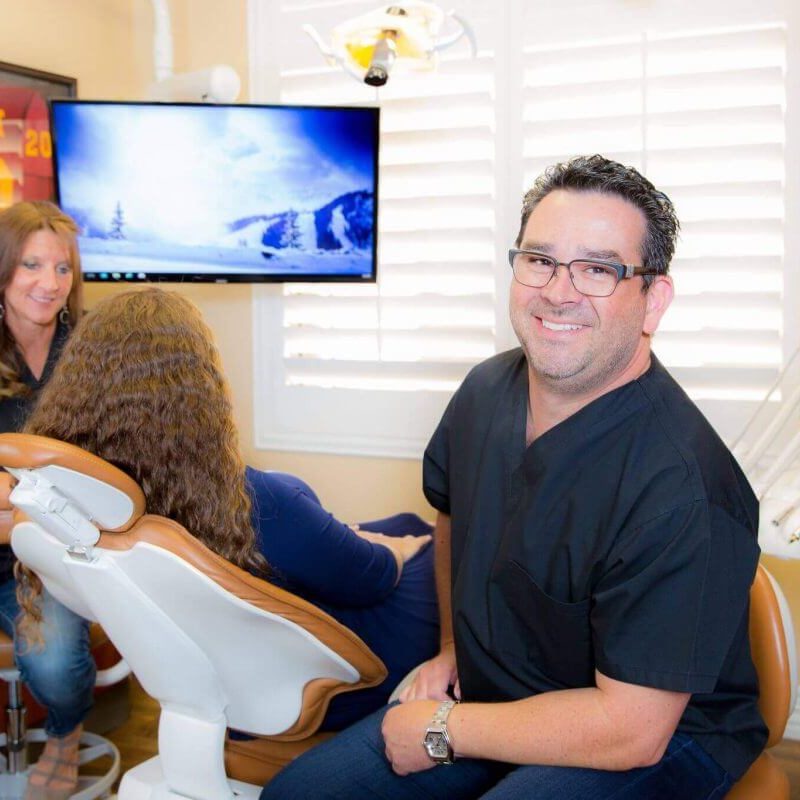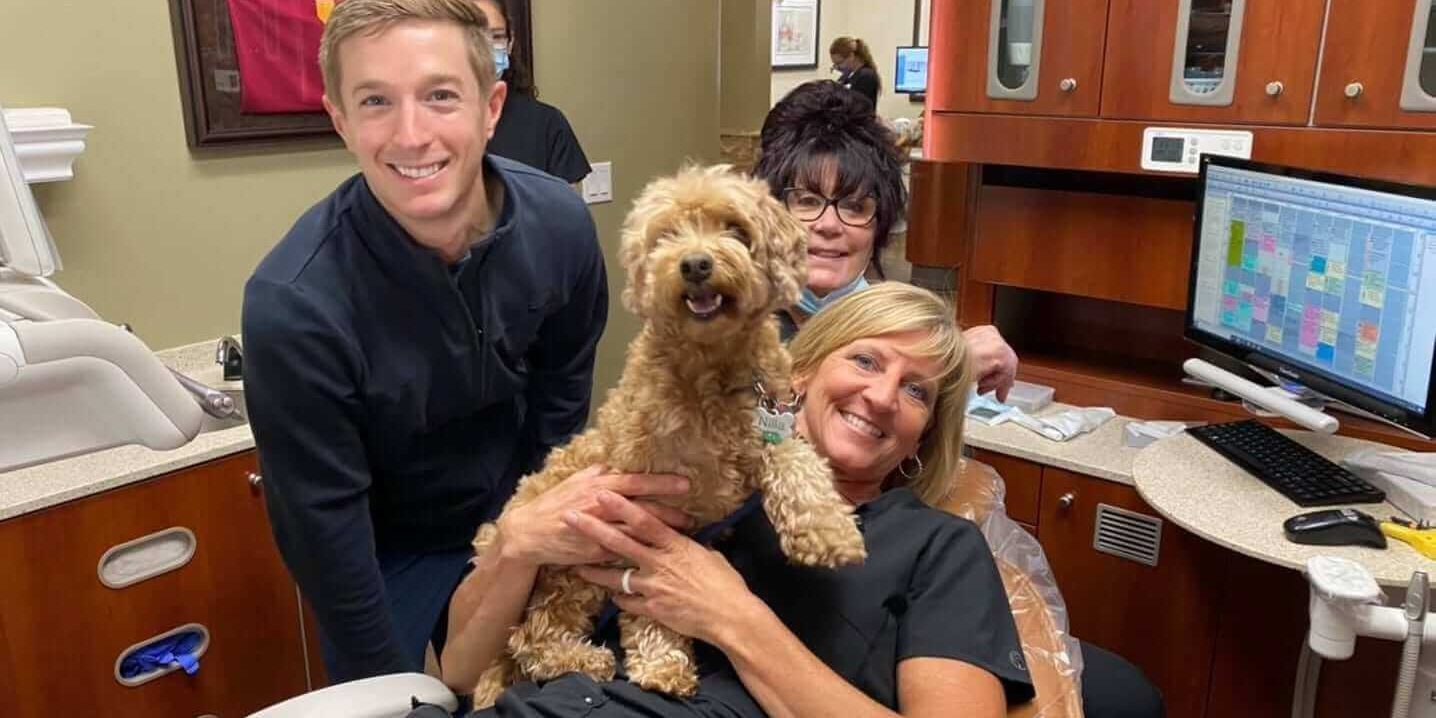
What is Oral Sedation?
Fear of the dentist is widespread. It is estimated that almost half of the U.S. population avoids dentists because of fear and anxiety. This means 30 to 40 million people do not get the critical dental care they need due to dental phobia (odontophobia). We have a great solution with conscious, oral sedation for our patients at Lakefront Family Dentistry.
Avoiding the dentist can cause serious health problems. Skipping routine visits now can lead to more complex issues later. Without regular cleanings, teeth can develop severe and even life-threatening conditions.
Fortunately, oral sedation dentistry provides people who have odontophobia with a way to get the treatment they need. Patients who were once fearful when visiting the dentist can now feel relaxed and comfortable with the use of gentle oral sedatives.
Lakefront Family Dentistry is now offering oral conscious sedation to residents of the Southern California. This means residents who have avoided the dentist can now receive the dental treatment they need with the help of oral sedatives. Dr. Derek B. Hauser, DDS, and Dr. Mark Phillipe, DDS, have received advanced training in sedation dentistry.

Types of Sedation Dentistry
Sedation dentistry uses different types of sedative medications to create a feeling of calmness and relaxation. Several types and levels of sedation can be used, including:
- Oral sedation involves taking a pill. This type of sedation is also called oral conscious sedation because patients are drowsy but awake. Patients who fall asleep can be woken up gently and easily. (Lakefront Family Dentistry’s best choice for its valued patients.)
- Inhaled sedation involves breathing a mix of oxygen and nitrous oxide (also known as “laughing gas”) through a mask placed over the nose. This sedation wears off quickly. It is the only form of sedation in which patients can drive themselves home afterward.
- Intravenous sedation involves receiving a sedative via a needle placed in a vein.
- General anesthesia uses medications that make patients unconscious (deeply asleep). With this type of sedation, patients cannot be easily awakened until the drug wears off or is reversed.
Lakefront Family Dentistry offers oral sedation, which provides a moderate level of sedation. This means patients can respond to verbal commands and a light touch/nudge on the shoulder or arm.
What To Expect During Oral Sedation Dentistry
Before the procedure, a patient will meet with the dentist to discuss and review:
- Dental work that needs to be performed
- Level of the patient’s dental anxiety
- Medical history
- Current medications
This discussion allows the dentist to determine the appropriate medication and level of sedation. After the consultation, the appointment will be scheduled. Patients will leave with a sedative prescription and instructions on usage.
On the day of the appointment, the patient will most likely take the sedative before arriving at the office. For this reason, someone will need to drive the patient to and from the appointment. Additional medication may be administered at the office, depending upon the appointment’s duration and procedures being performed.
When treatment is finished, patients will be driven home by their companion (usually a friend or family member). Someone should stay with the patient until they have fully recovered (approximately 4 to 10 hours).
During the appointment, patients can expect to:
- Feel relaxed and comfortable, even a little sleepy
- Be conscious and responsive (able to talk)
- Receive constant monitoring of their vital signs
- Have little or no memory of the time spent at the dentist
- Experience little or no pain
Safety of Using Oral Sedation During Dentistry
As with any medical procedure, there are always risks. However, the majority of patients handle sedation well. Although side effects are rare, the most common are little or no memory of the procedure, dry mouth, or hiccups.
To decrease risks, patients should be honest about their medical history and current medications. This allows the dentist to select the most appropriate sedative for the patient.
Dentists can choose from a range of oral sedatives, all of which have proven safety records.
In addition, a patient’s vital signs are continuously monitored throughout the appointment. Baseline readings will be taken at a patient’s first visit so the dentist knows what is normal.
Monitoring includes:
- Oxygenation (oxygen saturation)
- Ventilation (CO2 and respiration rate)
- Circulation (heart rate, rhythm, blood pressure)
- Temperature (body temperature)
- Documentation (documentation of all drugs, dosages, and administration times)
Benefits of Oral Sedation
When patients are scared or anxious, treatment can be challenging. Patients may move or react in ways that might make procedures difficult to complete. As a result, a patient’s anxiety levels increase more, thereby compounding the problem.
A patient with anxiety during dental procedures who chooses oral sedation is much easier to treat because they are relaxed and cooperative. The dentist can work more quickly and efficiently. The result is a positive experience for both the patient and the dentist. By transforming a potentially negative experience into a positive one, patients are more likely to return for additional work and regular check-ups.
In addition to helping patients overcome their fears, oral sedation dentistry allows dentists to accomplish more work in a single visit. Dr. Hauser can focus on his work and provide the highest quality of treatment, which patients at Lakefront Family Dentistry are accustomed to receiving.
Oral Sedation for Root Canal: A Case Study
Karen had a long history of dental fear. As a result, she’d put off treatment for years, despite frequent mouth pain. However, after hearing about the use of oral sedation in dental offices on Good Morning America, Karen decided to give it a try.
The night before her appointment, Karen took a pill and had her friend drive her to the office. Additional medication was administered before the start of her procedures, which included; three fillings, a root canal, and two crowns. Amazingly, Karen remembered almost nothing the next day.
“I don’t remember the anything, and my life has been forever changed about going to the dentist and taking better care of my health” she said.
Now that one side of her mouth has been fixed with the best dentists in Lake Elsinore, CA, Karen is ready to have the rest of her dental work completed with oral sedation.
Who Benefits from Oral Sedation Dentistry
People fear the dentist for many different reasons. Common causes of dental fear include:
- Pain (whether due to experience or stories from others)
- Medication Effects (patients sometimes fear Novocain and possibility of a “big lip”)
- Not Being in Control (some patients have a fear of relinquishing control, even at the risk of their health)
- Incorrect Assumptions (people often fear that the local anesthetic won’t work)
- Gagging (patients are sometimes afraid they will choke or gag on water or the tools, even though expert staff is there 100% of the time to ensure this does not happen)
- Self-Consciousness and Vanity (some are uncomfortable with how close a dentist is to their face)
When thinking about the dentist, people with odontophobia (fear of the dentist) might experience difficulty sleeping, racing heart, dry mouth, elevated blood pressure, anxiety, feelings of suffocation, lightheadedness, the urge to gag or vomit, hyperventilation, or nausea.
Research has shown that oral sedation is ideal for patients who have:
- high levels of dental fear or anxiety
- put off treatment because of fear
- cannot keep their mouth open for extended periods
- low-pain threshold
- severe gag reflex
- sensitive teeth
- an inability to sit still
- require a lot of dental work
Sometimes, patients who are fine with regular check-ups and dental cleaning might experience anxiety about more extensive treatments, such as root canals or pulling wisdom teeth. For these patients, oral sedation for wisdom teeth removal or a root canal is a great option.

If you or a family member has a fear of the dentist, contact the best family dentist in Lake Elsinore -- Lakefront Family Dentistry at (951) 244-9495 or fill out an online consultation form. Dr. Hauser is happy to answer all your questions about oral sedation and help your family have a relaxing dental experience.




